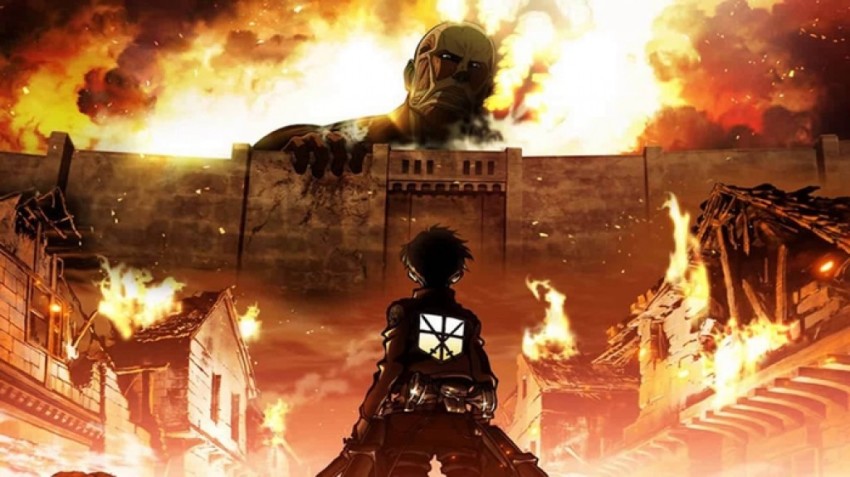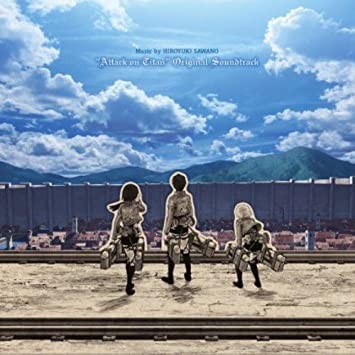Attack on Titan OST
July 27, 2020 · 0 comments
By Shelley Pallis.
 The first volume of Hiroyuki Sawano’s award-winning soundtrack to the anime series Attack on Titan is now out on vinyl, for all those of you who want the retro feel and an excuse to have an even bigger version of that cover art, and another chance to hear the tunes that launched a thousand Scouts.
The first volume of Hiroyuki Sawano’s award-winning soundtrack to the anime series Attack on Titan is now out on vinyl, for all those of you who want the retro feel and an excuse to have an even bigger version of that cover art, and another chance to hear the tunes that launched a thousand Scouts.
In interviews, Sawano has offered a frankly bland account of his inspirations, citing Chage & Aska, and then Tetsuya Komuro as his early heroes. He points, later in his career, to Joe Hisaishi, Ryuichi Sakamoto and Yoko Kanno as specific influences that led him into working in soundtracks, and certainly one gets a sense in this first album of the echo particularly of Kanno, in his epic orchestrations and odd augmentations. But it’s his use of brass, in particular, that really comes out in the Attack on Titan soundtrack – Sawano appears to have found a way to really push the sheer scale of the Titans into the soundscape by throwing in more brass, more brass, more brass, until your stereo is shaking like a belligerent, never-ending fanfare, heralding the end of the world.
Regular readers of this blog may recall the obituary for Isao Tomita, chronicling his work on the soundtrack for Osamu Tezuka’s Jungle Emperor, for which the creator asked him to come up with recyclable musical stings. Just as Tezuka had an “image bank” of re-useable images, he wanted a sound bank of materials that could be samples, snipped and rearranged repeatedly in his serial.
 Incidental music is often difficult to review – in its most extreme cases, such as much of Kenji Kawai’s soundtrack for Ghost in the Shell, the less memorable portions, when taken out of context, sound like somebody tuning their instruments or randomly smacking drums. Inevitably, Sawano’s score for Attack on Titan stitches together music for fight scenes and chase sequences, clearly intended for use in similarly short bursts. However, he does so with a certain panache, turning each cluster of stings into a stand-alone piece, usually running for three or four minutes.
Incidental music is often difficult to review – in its most extreme cases, such as much of Kenji Kawai’s soundtrack for Ghost in the Shell, the less memorable portions, when taken out of context, sound like somebody tuning their instruments or randomly smacking drums. Inevitably, Sawano’s score for Attack on Titan stitches together music for fight scenes and chase sequences, clearly intended for use in similarly short bursts. However, he does so with a certain panache, turning each cluster of stings into a stand-alone piece, usually running for three or four minutes.
Many of the tracks have odd typographical titles that must be an editorial nightmare – I’m listing them here using plain text, and not including umlauts, unnecessary accents, kanji and in several cases, wing-dings in the titles. The central piece, in its full-length version, throws in everything but the kitchen sink – a choir straight out of Carl Orff (filtered, one suspects, through similar soundtrack efforts by Michael Kamen), rocking guitars, and that’s before Mika Kobayashi wanders in. I’d say there were half a dozen sections that could, and have been excerpted as musical stings – this is a multi-use track that an audio director can plunder to plug a number of holes.
The gentle piano in “Eye-Water” is prodded at by occasional dissonances in the background, as if someone is faffing with their phone at a piano concerto. “Body Motion” thumping menace, big brass for giant enemies and grand gestures, whereas “Counter-Attack Mankind” brings back in the human choir, even more lovely brass and extra strings to provide a musical counter-point to the Titans. “Army Attack” mixes more ethnic themes, as if a bunch of Bartok-loving experimental violinists from an Irish birthday party have gate-crashed the recording
Similar whimsy lurks somewhere in the lyrical sound picture of “Vogel im Kafig” and “Bauklotze” although vocalists Cyua and Mika Kobayashi are singing in German, hardly the language of love. This, along with much other Teutonic tastes in the soundtrack, and among the names in the show, has led to much internet speculation about whether Attack on Titan is actually set in some kind of alternate Germany. But looking back over Sawano’s other works, German lyrics and themes show up regularly enough to be a clear interest for the composer, not something Attack on Titan-specific.
And then, of course, there are the songs, including “Reluctant Heroes” sung in English, and a special mention for “DOA” by Aimee Blackschleger, which has English lyrics worthy of a mental Eurovision rock anthem. I can well imagine Estonia, or Iceland, or Bosnia-Hercegovina sending an all-girl leather-clad metal band rocking out earnest exhortations like: “Keep your weapons aimed / Here comes the chilling face / Pushin’ down your fear/ Jump on the necks of the monsters.” Yes, yes, jump on their necks, before they tear your town limb-from-limb. “Where are your mum and dad?” she adds, as if someone really ought to be supervising all this monster neck-jumping.
“Here come the giant hands, breaking through the walls!”
Douze points.
The Attack on Titan original soundtrack, volume one, is released on vinyl by Anime Limited.
Leave a Reply